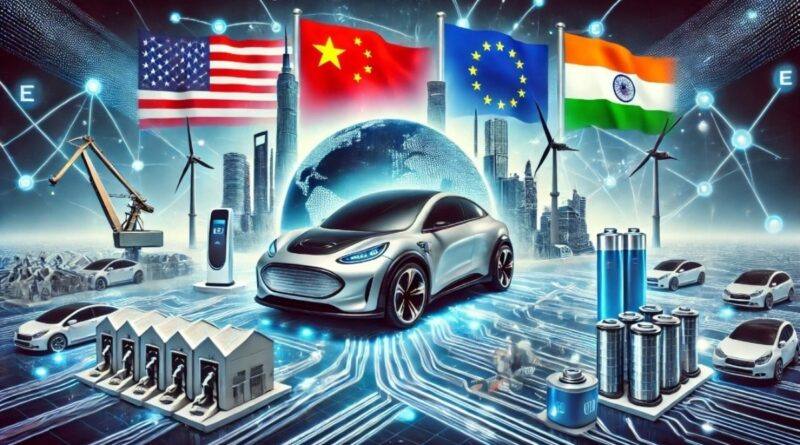Electric Car Trade War – West vs China: India’s Emerging Opportunity
The Electric Vehicle (EV) market is expanding rapidly as countries work toward greener transportation. Many nations and companies are eying for leadership in this growing industry. Major players have been building up on the infrastructure for years, but others have been stuck with the conventional cars. China has been investing heavily to become the major contributor to the global EV industry, but the trade war with the West has created tensions that may shift this balance.

EV Manufacturers and Market Share by Country
1. China (60% global market share): Major Players- BYD, Nio, Xpeng, Geely
China dominates the EV market with affordable production, government subsidies, and a strong supply chain for batteries but has common Chinese product issues of reliability in the global market.
2. United States (20% global market share): Major Players- Tesla, Rivian, Lucid Motors
Led by Tesla, the U.S. excels in innovation and premium EV models. Government support like tax incentives boosts local production, but is not able to match the price of the Chinese cars even after heavy tariffs of 100%.
3. Europe (12% global market share): Major Players- Volkswagen, BMW, Mercedes-Benz, Renault
European automakers focus on quality, advanced technology, and meeting strict environmental regulations. but still not able to match the price of the Chinese cars even after heavy tariffs of 35.3%.
4. South Korea (5% global market share): Major Players- Hyundai, Kia
Known for reliable and mid-priced EVs, South Korea has a growing global presence in competition with China. Their technology is one of the best.
5. Japan (2% global market share): Major Players- Nissan, Toyota, Honda
Although a pioneer in hybrid vehicles, Japan is gradually scaling up its focus on pure EVs. Major Mergers involving Nissan and Honda being initiated to sustain the global presence but the deal is yet to be finalised and the effect on the market is unknown.
6. India (1% global market share): Major Players- Tata Motors, Mahindra
India is emerging as a cost-efficient manufacturing hub and has strong growth potential for local EV demand, but very much lacks the manufacturing infrastructure to become a global player.
Trade War Tariff’s by US and EU
China’s dominance in the EV sector, driven by low manufacturing costs and subsidies, is challenging automakers in the U.S. and Europe. These countries have taken steps to protect their industries.
United States: The U.S. imposed high tariffs of 100% on Chinese EVs and parts to protect local manufacturers like Tesla. The Inflation Reduction Act (IRA) offers tax credits for EVs made in the U.S., encouraging domestic production over imports. New US President Donald Trump who will be taking charge of the office in January is set to further increase the tariffs.
European Union: The EU plans to increase taxes on Chinese EV’s and is investigating China’s government subsidies. This aims to support European brands like Volkswagen and BMW, which are struggling against low-cost Chinese competitors.
China’s Response
China retaliated by restricting exports of key EV battery materials like Lithium and Gallium. Since China controls over 60% of the global battery supply chain, this move has caused concern about disruptions for Western automakers. China has recently cancelled the order of 150,000 EV’s to EU to build up pressure to revoke the tariffs and more retaliations are expected from China.
Opportunities for India
India can benefit from the global EV trade war as countries look for alternatives to China.
1. Mineral Resources: India has domestic reserves of lithium and can form trade partnerships with nations like Australia and Chile to secure more supplies.
2. Low-Cost Manufacturing: India’s affordable labour and manufacturing costs make it an attractive alternative for producing EVs and components.
3. Government Support: Policies like the PLI scheme and FAME-II initiatives are designed to promote EV production and increase demand.
4. Growing Domestic Market: Rising demand for affordable EVs in India offers a strong local market for manufacturers.
5. Global Investments: Companies from the U.S. and Europe seeking alternatives to China could invest in India’s EV sector, bringing advanced technology and funds.
Plan for Future
To fully seize this opportunity, India needs to address a few challenges:
1. Charging Stations: More EV charging points are needed, especially in small towns and rural areas.
2. Battery Production: India should invest in local battery manufacturing and recycling to reduce dependence on imports.
3. Workforce Training: Building a skilled workforce in EV manufacturing and servicing is essential for growth.
4. Regulatory Simplification: Clear and investor-friendly policies can attract global companies to India.
5. Energy Infrastructure: India’s electricity grid needs upgrades to handle the extra demand from EVs.
Conclusion
The electric car trade war between China and the West has opened a path for India to become a key player in EV manufacturing. The Indian Government must use this opportunity fully by improving infrastructure and encouraging foreign investment, India can grow its EV market share globally. With strategic efforts, the country has the potential to create jobs, attract investments, and lead in the global shift toward sustainable transportation.




